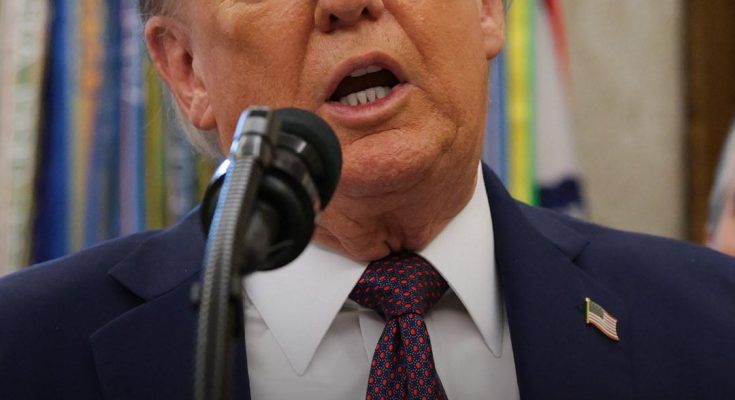During a press briefing, Donald Trump stunned listeners by saying, “Without the United States, the whole world would die.” The words were bold and maybe a little shocking. He made the statement while announcing that U.S. Space Command would be relocated to Alabama. Trump also praised America as the “hottest, the best financially,” and said he rebuilt the country during his first four years. Critics and supporters quickly jumped into the debate. Many argued the claim was inflated, while others saw it as proof of his unapologetic patriotism. He also bragged that he stopped seven wars, linking the outcome to his tariff strategy.
What Trump Said in Detail
Trump’s tone during the conference was fiery. He insisted that America held unmatched power in the world. He described the U.S. as too important to ever be ignored. His claim that the world would simply die without America captured headlines. It was a dramatic message, one that grabbed attention fast.
At the same time, he pushed his record on conflict resolution. He told reporters, “I settled seven wars and numerous of those wars were because of trade.” Trump tied these outcomes to tariffs, calling them a “magical negotiating tool.”
In the same press conference, a reporter questioned Trump about rumors of his death over the long weekend. Trump then made digs at Joe Biden, saying the previous president could disappear for months without anyone questioning his health. Trump compared that to his own brief absence, which sparked death rumors online that had gone viral.
How People Reacted
The reaction was loud. Media outlets and fact-checkers moved quickly. They argued the claims went beyond reality. Analysts pointed out that many conflicts Trump referenced are not actually resolved. Some wars remain active, and others only reached shaky ceasefires.
The Associated Press highlighted that Trump helped with some peace talks. But reporters stressed that most conflicts are still ongoing. They listed the seven disputes he referenced. Each one, they said, had different levels of progress. Some are fragile, while others barely moved.
Breaking Down the Seven Wars Claim
So what are the seven wars Trump claimed to end?
- Israel and Iran
A U.S.-backed ceasefire stopped a short confrontation. It helped, yes. But experts say tension still burns. - Rwanda and the DRC
Mediation brought a deal on paper. Violence, however, continues with rebel groups active. Analysts call it fragile. - Armenia and Azerbaijan
They signed an economic agreement. Yet, a full peace treaty remains unfinished. Disputes drag on. - Thailand and Cambodia
Trade pressure led to a border ceasefire. But incidents flared again soon after. Peace is far from stable. - India and Pakistan
A ceasefire brought calm to Kashmir. India denies U.S. involvement. Pakistan claims Trump’s role mattered. - Egypt and Ethiopia
Talks over the Nile dam eased tension. No final deal was made. Weather changes may have helped more than diplomacy. - Serbia and Kosovo
Trump pushed for dialogue. Yet European leaders still lead the main negotiations. Progress remains limited.
Experts agree Trump was involved in some talks. Still, only a few produced lasting results. Even Trump shifted his language later. Sometimes he said “seven wars.” Other times, he dropped it to “three.” That inconsistency made people doubt his narrative even more.
Why the Statement Matters
Trump’s claim about the world dying without America highlights his worldview. It fits with his “America First” message. He often frames the U.S. as the core of global survival. Supporters say he is right, that America drives security and economy. Many critics say this outlook ignores allies and weakens international cooperation.
His tariff diplomacy plays into the same theme. He argues that trade threats bring peace. But many analysts say that strategy is risky. Tariffs might win quick concessions, but they rarely solve deeper disputes.
The U.S. role in global leadership has always been debated, and Trump’s comments reignited that debate, showing the split between those who admire strong talk and those who fear it isolates America.
A Look at the Fallout
For everyday people, Trump’s statement sparked mixed feelings. Some felt pride when they heard their country described as the heartbeat of the world. Others felt uneasy, seeing his words as overblown. Social media is filled with both praise and memes. His supporters treated the claim as patriotic truth, but his opponents mocked it as arrogance.
Diplomats reacted with caution. They know words matter in international relations. A boast like this could alienate partners. Yet, allies also know America plays a huge role. Even critics admit that U.S. influence is undeniable. The argument then becomes about tone, not just substance.
Closing Thoughts
Trump’s declaration, “Without the United States, the world would die,” was classic Trump. It was dramatic, headline-grabbing, and questionable. It showed his confidence in American power, while also sparking debate about exaggeration.
His claim of ending seven wars adds another layer. He did play a part in talks, but the truth is less clear-cut. Many conflicts remain unresolved, and experts question how much credit belongs to him alone.
In the end, the statement is less about exact facts and more about style. Trump frames himself as the force behind global peace and survival. Whether people agree or roll their eyes, his words keep him at the center of conversation. And that, maybe, is what he really wants.



